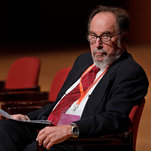David Baltimore, the esteemed molecular biologist and Nobel Prize winner, has died at the age of 87. His groundbreaking research significantly altered the field of biology, particularly through his work on retroviruses, which paved the way for a deeper understanding of diseases such as HIV.
Born on March 7, 1934, in New York City, Baltimore made his mark early in his career. At just 37, he made a discovery that challenged existing biological paradigms. His findings on how retroviruses operate not only transformed scientific thought but also had profound implications for medical research and treatment.
Significant Contributions to Science
Baltimore’s most notable achievement came in 1975, when he co-discovered reverse transcriptase, an enzyme that allows RNA viruses to replicate within host cells. This discovery was crucial in the understanding of retroviruses and facilitated advancements in the development of treatments for HIV/AIDS.
For his contributions, Baltimore was awarded the Nobel Prize in Physiology or Medicine in 1975, alongside Howard Temin and David Baltimore. Their work ushered in a new era in virology, changing how scientists approach viral infections and therapies.
Throughout his career, Baltimore held prestigious positions, including serving as the president of the California Institute of Technology (Caltech) from 1997 to 2006. His leadership and vision helped nurture future generations of scientists, fostering an environment of innovation and collaboration.
A Lasting Legacy
Beyond his scientific achievements, Baltimore was known for his commitment to science education and public outreach. He frequently advocated for the importance of scientific integrity and the role of research in society. His efforts to communicate complex scientific concepts to the public have had a lasting impact on how science is perceived and valued in modern society.
Colleagues and students remember Baltimore not only for his brilliance as a scientist but also for his kindness and mentorship. His passing on **October 15, 2021**, leaves a void in the scientific community, but his legacy will undoubtedly continue to inspire future researchers and innovators.
In a statement, the National Institutes of Health (NIH) expressed deep sorrow at his passing, highlighting his immense contributions to science and public health. As the world reflects on Baltimore’s achievements, it is clear that his work will continue to shape the fields of molecular biology and medicine for years to come.






































































